
Do Animal Welfare Campaigns and Reforms Hurt or Help Animal Rights and Abolition? - The Theme of the Third Annual United Poultry Concerns Forum
An Animal Rights Article from All-Creatures.org
FROM
Mary and Frank Hoffman
January 2003
(click on the links to enlarge)
This forum brought together activists from both sides of the welfare/rights issue in a harmonious exchange of ideas on the grounds of the United Poultry Concerns' sanctuary in Machipongo, Virginia, USA. The consensus of opinion was that animal welfare campaigns and reforms do not hurt animal rights and abolition, if the direction of the animal welfare activity is abolitionist in its ultimate goal - i.e. the only way to totally eliminate animal suffering is to "Go Vegan!"
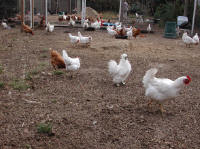
(Photo-01:
A section of the United Poultry Concerns sanctuary.)
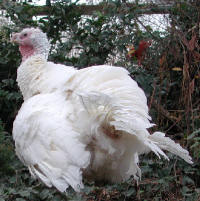
(Photo-02: A turkey at United Poultry Concerns' sanctuary
enjoying life in peace as God intended.)
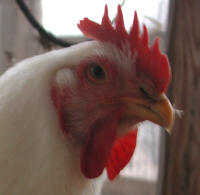
(Photo-03:
This chicken was quite curious about our camera and came closer to get a
better look.)
Being on the grounds of the sanctuary added emphasis to the purpose of the
meetings as the birds were made a part of the proceedings rather than being
excluded, had the meeting been held in a hotel.
We were able to visit with the chickens, ducks, turkeys and cockatiel in
the morning, at lunch time, and during our meeting breaks. Such
interaction allowed us to better appreciate the individual personalities of
these birds, many of whom were quite affectionate. Whatever food was
left over was fed to the sanctuary residents. And since the kitchen
opens onto the porch, which is used for infirm birds, we could feed the
birds. They really loved the leftover pasta!
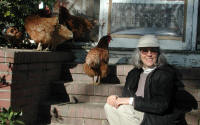
(Photo-04 : Mary Hoffman sitting on the back porch steps with
some of the residents.)
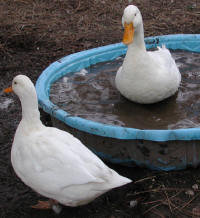
(Photo-05 :
Two of the ducks enjoying their day at UPC's sanctuary.)
The first speaker on Saturday was Kirsten Rosenberg of The Animals' Agenda.
Her subject was "Throwing the Baby Out With the Battery Cage: Looking Out
for Animals' Welfare in the Pursuit of Rights." Kirsten's presentation
came across as a "business approach" to arriving at our goals of eliminating
animal suffering. She expressed that politics is the art of
compromise, and that in our pursuit of animal rights in the future, we need
to find ways to lessen the suffering of animals in our present time.
"Historically, divisiveness is deadly", she said, and we need to support all
actions that will help the animals, even in minor ways.
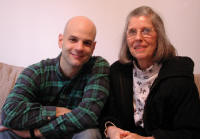
(Photo-06: During a lunch break, Joe Miele and Mary Hoffman interrupted
their conversation to pose for this picture.)
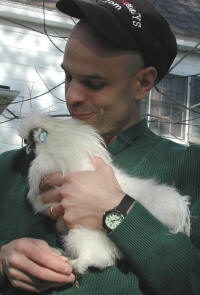
(Photo-07:
When I saw Joe Miele holding this chicken, I pictured Isaiah's prophecy of
the Peaceable Kingdom (Isaiah 11:6-9)
The
second speaker was Joe Miele of New Jersey Animal Rights Alliance. His
subject was "Getting Back to the Core of the Animal Rights Movement."
Joe addressed the four major aspects of the animal advocacy movement: animal
rights, animal rescue, animal sanctuaries, and welfare reform. He
discounted all "band-aid" actions of the welfare movement that don't
eliminate animal suffering. Joe's catchy phrase "eliminate, not
alleviate" is the core of his philosophy.
Joe came across as a purist abolitionist, but at the same time realizing
that the abolition of animal suffering was not going to happen overnight,
and that we have to do whatever we can to further that goal. Welfare
that doesn't do that is working against the animals. Often I
had heard Joe roaring like a lion in his e-mails, but he is really a pussy
cat at heart, as can be seen in this photo.)
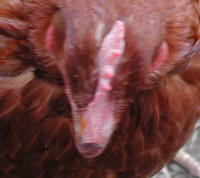
(Photo-08: This is one of the rescued hens at the sanctuary who was debeaked
by having the end of there beak burned off with a hot knife. This is
just one of the torturous things that chickens are subjected to in our
factory farms.)
Joe showed little "cages" to emphasize the minor difference that the
McDonald's, Burger King, and Wendy's "reforms" made in the torturously
cramped conditions that laying hens are forced to live in. The
discussion which followed, brought out the fact that even these minor
differences reduced the mortality from 20% to only about 3%.
Nevertheless, battery hen houses are still concentration camps.
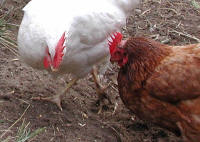
(Photo-09: Two more mutilated (debeaked) hens who now can live out their lives in peace. Photo-right: Battery hen house.)
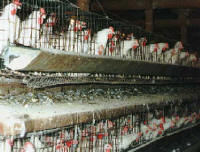
(Photo-10: Battery hen house.)
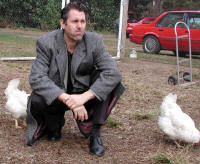
(Photo-11 : Steve Best sporting his philosopher's gaze with the hens.)
This
led us into the third presentation of the day presented by Paul Shapiro of
Compassion Over Killing, a Washington DC based organization. He
presented the video, Hope for the Hopeless: An Investigation and Rescue at a
Battery Egg Facility, an 18 minute documentary which shows the horrors of
the lives of the battery hen. Hens were shown wedged into the wire
cages so that they were unable to get food or water. A dead hen was
left to decompose among her cage-mates. Such depictions emphasize the
utter disregard and lack of compassion for the chickens in these factory
farms.
This
film also reminds us how depraved some human beings can be compared to the
tenderness expressed by the rescuers who took a few of the more seriously
injured hens to get veterinary care, which is never provided in hen houses.
After lunch, Steve Best of Voice for All Animals, and an Associate Professor of Philosophy and Humanities at the University of Texas, El Paso, presented his talk entitled, Undoing False Oppositions: Lessons from the Social Revolutionaries. He said that veganism is our radicalism. He defended the recent welfare reforms brought about in the fast food industry through the efforts of PETA and others.
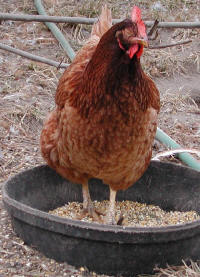
(Photo-12 :
This chicken was apparently fast asleep on her feet, while standing in her
feed bowl.)
Steve argued that welfarism and reforms are not logically or practically
separate from revolution and rights. Steve emphasized that capitalism was
the main cause of the torture of animals in the agriculture industry.
But, we believe that the real problem lies in the depraved nature of our
fellow human beings who abuse animals for their own personal gain.
They use capitalism to further their goals. By comparison, the same
evil things were happening in the Soviet Union, and they are happening in
China, today, at an ever increasing rate. The "revolution" that is
needed is within the human heart. Steve said that we need to develop a
coherent strategy for the animal rights movement similar to the other major
historical social movements.
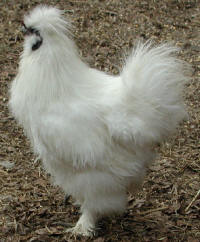
(Photo-13 :
This fluffy-feathered chicken attracted a lot of attention.)
The next speaker was Sean Day, an attorney from Washington DC, who presented his talk entitled, "Beyond Rights Vs. Welfare: A Model for Evaluating Efforts in Furtherance of Animal Rights." He emphasized that any welfare action that isn't at least a step toward abolition is not doing the animals any good.
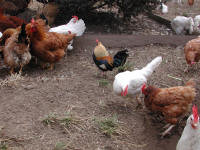
(Photo-14 : More of the chickens at the United Poultry Concerns' sanctuary.)
Sean said that welfare reform laws seem to empower animal abusers more than
they serve to help eliminate the suffering of animals. He gave the
example of Edward Taub, who was convicted of animal abuse in the 1981 Silver
Springs, MD monkey case, only to have his conviction overturned in federal
court based on the ineffective Animal Welfare Act. He said that since
1966 there have been no criminal convictions resulting from the Animal
Welfare Act. Additionally, 85% of all animals are not covered by this
Law.

(Photo-15 :
Munchkin joined her companion at our Sunday session, lounging in her pouch
on Ellen Coyote's lap.)
Sean, a former welfarist, is now a purist abolitionist. He opposes the current "Downed Animal Legislation Amendment", because there is no enforcement provision. He said that the only veterinary care provided is intended to get the animal to walk to its death.
The last speaker was Bruce Friedrich of People for the Ethical Treatment of Animals (PETA), who spoke on Sunday morning. His talk was entitled, "Welfare v. Liberation: Mutually Exclusive? Bruce's main emphasis was upon the successes and media attention that lead to people going vegan. He argued that the welfare reforms negotiated with the fast food giants brought the abuse of animals in the food industry to the public eye.
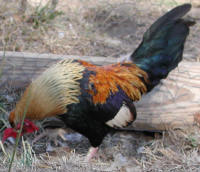
(Photo-16:
This chicken had the most exotically colored plumage in the sanctuary.)
Before coming to PETA, Bruce spent more than six years working in a shelter
for homeless families and soup kitchens in inner-city Washington, DC.
FoFollowing each speaker and at the end of each day's talks, there was a discussion period for the free exchange of ideas.
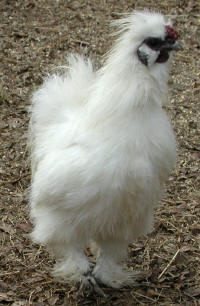
(Photo-17:
This fluffy-feathered rooster is decked out in all his finery.)
We emphasized that we must direct our attention to the religious community in ways that do not depart from the Bible. It is important to show God's intent of vegan living both in the creation (Genesis 1:28-29) and in heaven to come (Revelation 21:4). We emphasized that the Hebrew Biblical understanding of compassion for animals has been lost in most of Christian teachings, and it needs to be reintroduced.
The final consensus of opinion was:
- that we need to find better ways of working together toward our common goal;
- that it is not worth pursuing any welfare or reform activity that is not a step toward abolition,
- that we must emphasize "Go Vegan!" as a part of any activity.
Your comments are welcome [email protected]
Photos are by Frank L. Hoffman
Return to Animal Rights Articles







